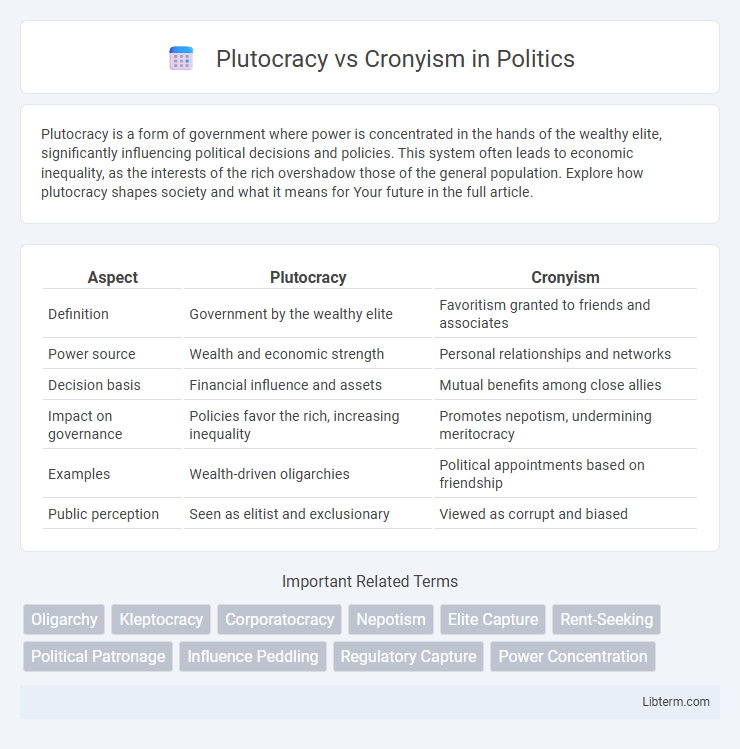Plutocracy is a form of government where power is concentrated in the hands of the wealthy elite, significantly influencing political decisions and policies. This system often leads to economic inequality, as the interests of the rich overshadow those of the general population. Explore how plutocracy shapes society and what it means for Your future in the full article.
Table of Comparison
| Aspect | Plutocracy | Cronyism |
|---|---|---|
| Definition | Government by the wealthy elite | Favoritism granted to friends and associates |
| Power source | Wealth and economic strength | Personal relationships and networks |
| Decision basis | Financial influence and assets | Mutual benefits among close allies |
| Impact on governance | Policies favor the rich, increasing inequality | Promotes nepotism, undermining meritocracy |
| Examples | Wealth-driven oligarchies | Political appointments based on friendship |
| Public perception | Seen as elitist and exclusionary | Viewed as corrupt and biased |
Understanding Plutocracy: Definition and Origins
Plutocracy is a political system where power is primarily held by the wealthy, enabling the richest individuals to influence government policies and decisions. Originating from the Greek words "ploutos" meaning wealth and "kratos" meaning power, plutocracy highlights governance driven by financial elites rather than democratic representation. This concentration of wealth creates disparities in political influence, often leading to policies favoring the affluent class over broader societal interests.
What Is Cronyism? Key Features and Background
Cronyism refers to the practice where influential individuals in power grant favors, jobs, or advantages to friends, relatives, or close associates regardless of their qualifications, undermining meritocracy and fairness. Key features of cronyism include nepotism, favoritism, lack of transparency, and abuse of authority, often leading to inefficiency and corruption within organizations or governments. Historically, cronyism has been prevalent in political systems lacking accountability, contributing to economic disparity and eroding public trust in institutions.
Plutocracy vs Cronyism: Core Differences
Plutocracy is a system where wealth directly translates into political power, concentrating control in the hands of the richest individuals or families. Cronyism involves favoritism where government officials give preferential treatment to friends or associates, often resulting in corrupt alliances regardless of wealth. The core difference lies in plutocracy's basis on economic dominance, whereas cronyism is rooted in personal relationships and nepotism within power structures.
Historical Examples of Plutocracy
Historical examples of plutocracy include the Roman Republic, where wealthy patrician families dominated political power, and Renaissance Venice, controlled by affluent merchant oligarchs. In early 20th-century United States, the Gilded Age saw industrial magnates like Rockefeller and Carnegie influence policies to favor their economic interests. These periods illustrate how concentrated wealth can translate into disproportionate political control and governance.
Real-World Cases of Cronyism
Cronyism often manifests in real-world cases such as political appointments and government contracts awarded to close associates, undermining meritocracy and economic efficiency. Notable examples include Russia under Vladimir Putin, where oligarchs with personal ties to the leadership control significant sectors of the economy, and India's history of business-government entanglements that hinder competitive practices. These scenarios illustrate how cronyism distorts market dynamics and consolidates wealth within a narrow elite, contrasting sharply with the formal wealth control characteristic of plutocracy.
Economic Impact: Plutocracy vs Cronyism
Plutocracy concentrates wealth and power in the hands of a few wealthy individuals, often leading to economic policies that favor their interests and exacerbate income inequality. Cronyism distorts market competition by enabling businesses with political connections to secure contracts, subsidies, or regulatory advantages, impeding innovation and efficient resource allocation. Both systems undermine economic growth and fairness by prioritizing elite benefits over broad-based economic opportunity.
Political Consequences: Who Really Holds Power?
Plutocracy consolidates power in the hands of the wealthiest individuals or families, allowing economic elites to shape policies that prioritize their interests, often at the expense of broader societal needs. Cronyism intertwines political authority with favoritism toward friends and business allies, resulting in corrupted decision-making that undermines fair competition and public trust. Both systems distort democratic governance, but while plutocracy emphasizes wealth as the means of influence, cronyism revolves around personal networks, complicating transparency and accountability in political power structures.
Social Effects: Inequality and Trust
Plutocracy and cronyism both exacerbate social inequality by concentrating wealth and power in the hands of a few elites, limiting opportunities for the broader population. This concentration erodes public trust in institutions, as citizens perceive governance as unjust and favoring privileged groups over meritocracy. The resulting social fragmentation undermines social cohesion and fuels discontent, reducing overall societal stability.
Combating Plutocracy and Cronyism: Policy Solutions
Implementing transparent campaign finance laws and strict lobbying regulations can reduce the influence of wealthy elites and corporate interests, curbing plutocracy and cronyism. Strengthening anti-corruption agencies with independent oversight ensures accountability in public office, preventing favoritism and misuse of power. Promoting equitable economic policies such as progressive taxation and public funding for political campaigns fosters a fairer distribution of political influence and resources.
The Future: Safeguarding Democracy from Elite Control
Safeguarding democracy from elite control requires robust transparency laws and campaign finance reforms that limit plutocratic influence and prevent cronyism. Strengthening independent institutions and promoting civic engagement empowers citizens to hold power accountable. Implementing these measures helps create a political ecosystem resistant to wealth-driven policymaking and insider favoritism.
Plutocracy Infographic

 libterm.com
libterm.com